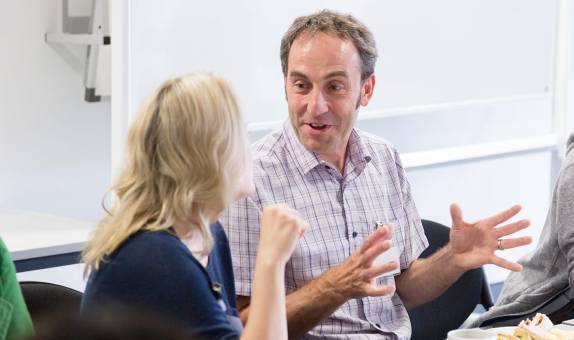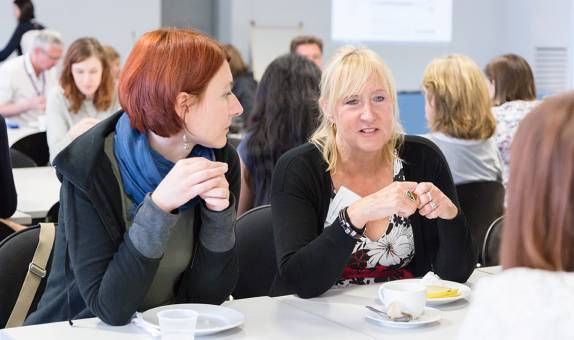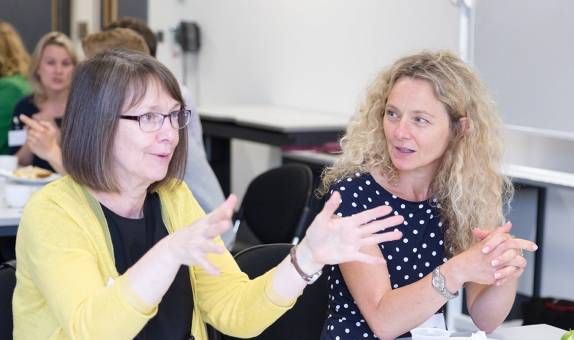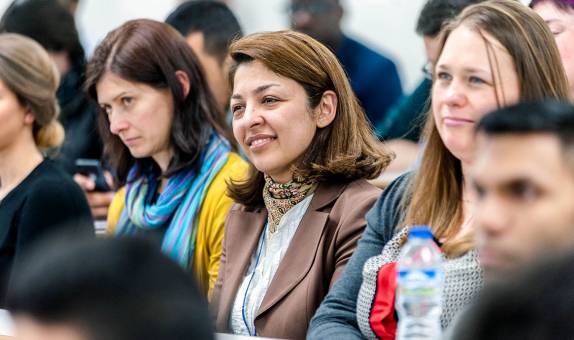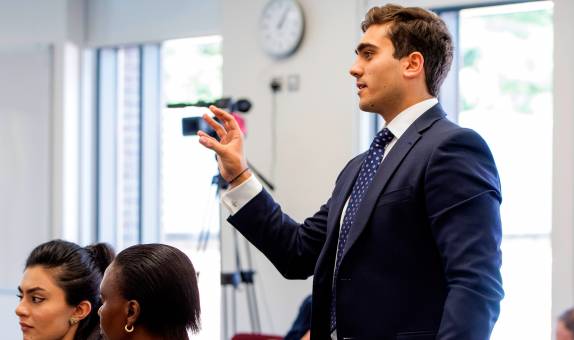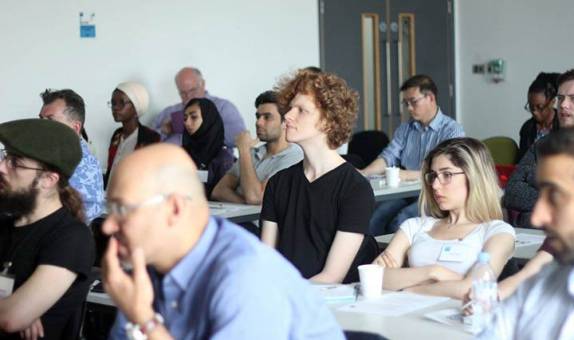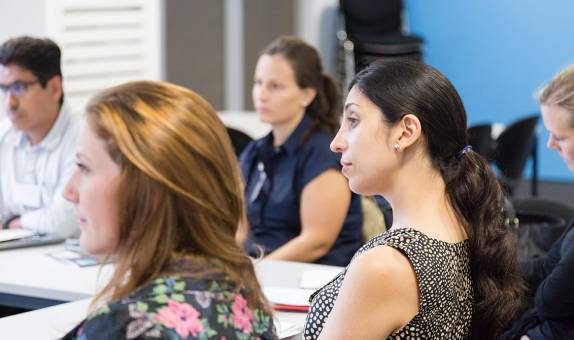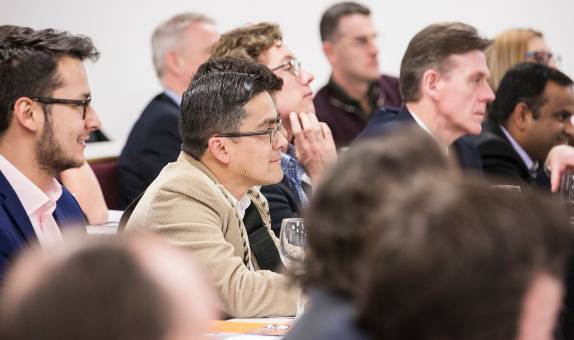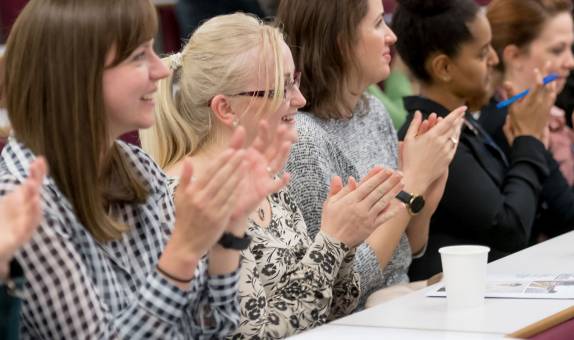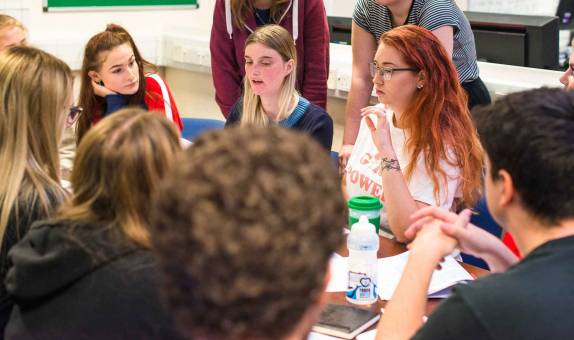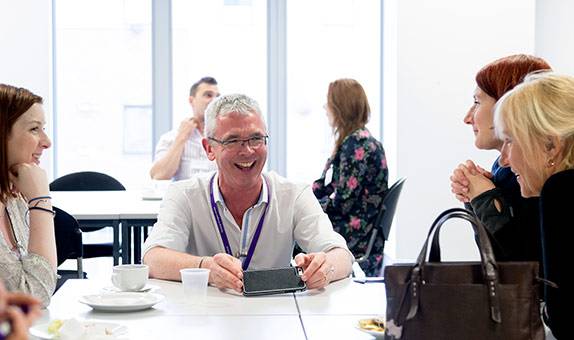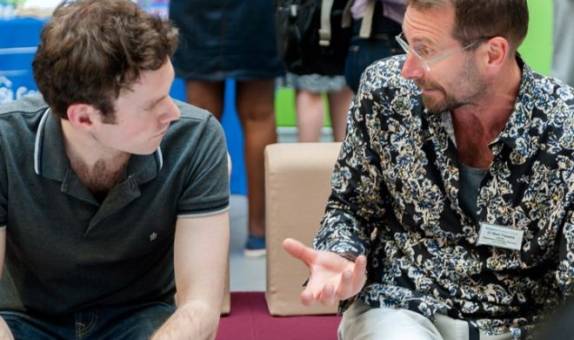Research in the Faculty of Business and Social Sciences
International excellence
Kingston University research has helped shape government policy in the United Kingdom and is making important contributions to public life across the globe, responding to the major scientific and intellectual challenges of today. We consider research to be integral to our distinctiveness, success and sustainability and it plays a vital role in contributing to the quality of our learning and teaching.
In the 2022 Research Excellence Framework (REF), 70% of our research was considered either world leading or internationally excellent and we are continuing to build our research reputation through fostering a collaborative, outward-looking research culture across the institution.
The research experience
The Faculty of Business and Social Sciences (FBSS) is one of the most research-intensive parts of Kingston University. It has an energetic research culture and therefore a plethora of research projects currently on offer.
Research students are a key and valued part of the research activities within the faculty. They help to build a strong research reputation, are vital members of our Research Centres and occasionally help with teaching undergraduate students.
As a research student, you will be part of an ambitious faculty that offers fantastic opportunities for inter-disciplinary research and experience, become a part of an extended research student community and develop contacts with external organisations in close collaboration with the faculty.
Our research degrees
The Faculty offers the following research degrees which are offered across a range of subject areas. Click the subject areas below for advice on how to write a research proposal.
MA/MSc by Research
This course is a flexible learning programme designed for anyone who wants to conduct an extended and supervised research project in an area of Social Sciences.
Students pursue an individual programme of research, which enables them to expand their knowledge of the subject area and provides them with an opportunity to contribute a piece of original research.
MPhil
The MPhil takes up to two years full-time or up to four years part time. It is awarded on the basis of a thesis of about 40,000 words which has been successfully defended in an oral examination.
Read more about our MPhil
Business and Management PhD
The Business School offers exciting projects and supervisory expertise across a range of business and management fields to enable you to pursue a topic to the highest academic level.
Read more about the Business and Management PhD
Law, Social and Behavioural Sciences PhD (including Criminology and Sociology, Economics, Law, Politics and International Relations, Psychology)
The PhD takes up to four years full time, or up to eight years part time. It is normally awarded on the basis of a thesis of 80,000 words which has been successfully defended in an oral examination.
Find out more about applying for a research degree in Economics, Psychology and Sociology and Criminology, Law and Politics, International Relations and Human Rights.
Current research themes: School of Law, Social and Behavioural Sciences
Politics, International Relations and Human Rights
Theme: Political theory and philosophy
Supervisors: Dr Antonio Cerella, Dr Simon Choat
Sample topics covered: Thomas Hobbes, Max Weber, Carl Schmitt, and René Girard, the crisis of modernity, the problem of political order in the post-Westphalian age, the ethical foundation of that order, contemporary anarchism, neo-liberalism.
Theme: Marxism
Supervisors: Dr Simon Choat, Dr Andy Higginbottom
Sample topics covered: Marx's Capital concerning the theorisation of US cotton slavery and British industrial capitalism, Marxism and post-structuralism.
Theme: Right wing politics, populism, fascism
Supervisors: Dr Steven Bastow, Dr Radu Cinpoes
Samples topics covered: French radical right-wing populism, with a particular focus on the Front National, the extreme right.
Theme: Conflict studies
Supervisors: Dr Antonio Cerella, Dr Radu Cinpoes, Dr Peter Finn, Dr Atsuko Ichijo, Dr Nevena Nancheva, Dr Ronald Ranta
Sample topics covered: War on Terror, Israeli/Palestine conflict, the new forms of violence in contemporary international relations, migration and conflict, identity politics.
Theme: Security studies
Supervisors: Dr Antonio Cerella, Dr Peter Finn, Dr Nevena Nancheva
Sample topics covered: impunity in national security operations, national security and human rights, the dynamics of radicalization, asylum seekers and security in the EU.
Theme: Nationalism
Supervisors: Dr Steven Bastow, Dr Radu Cinpoes, Dr Atsuko Ichijo, Dr Nevena Nancheva, Dr Ronald Ranta
Sample topics covered: theories of nationalism, food and nationalism, nationalism of Central and Eastern Europe, nationalism of France, nationalism of the British Isles, nationalism of East Asia, nationalism of the Middle East, nationalism and citizenship.
Theme: Migration, human rights, asylum seeking and social inclusion
Supervisors: Dr Radu Cinpoes, Dr Andy Higginbottom, Dr Hannah Miller, Dr Nevena Nancheva
Sample topics covered: migration, mobility and refugee issues, slavery, the practice of human rights and social justice, intra-EU migration and its implication for security governance.
Themes: Protest and human rights
Supervisors: Professor Ilaria Favretto, Dr Andy Higginbottom, Dr Hannah Miller
Sample topics covered: protest and social movements, industrial conflict in 20th century Italy, liberation thought from Africa, African America and Latin America, campaign and protest strategies, solidarity movements for the Palestinian peoples.
Theme: Political parties and political marketing
Supervisor: Dr Robin Pettitt
Sample topics covered: internal party democracy, the rhetoric of party leaders at party conferences, political marketing.
Theme: European integration
Supervisors: Dr Radu Cinpoes, Professor Ilaria Favretto, Dr Atsuko Ichijo, Dr Nevena Nancheva, Dr Robin Pettitt
Sample topics covered: European identity, European citizenship, European asylum-seeking regime.
Economics
Theme: Development economics/ political economy of development
Supervisors: Gavin Capps, Homagni Choudhury, Shaikh Eskander, Rex McKenzie, Chris Stewart, Jalal Siddiki, Christina Wolf
Examples of topics: the Indian economy, trade liberalisation, dependency theory, banking systems, exchange rates pass-through to consumer prices, industrial policies, structural change, demand-led growth in developing countries, state in economic development, natural experiments.
Theme: Labour economics
Supervisors: Homagni Choudhury, Javier Ortega
Examples of topics: regulations, impact of immigration, immigrant assimilation, immigration policies.
Theme: Political economy
Supervisors: Gavin Capps, Rex McKenzie, Javier Ortega, Christina Wolf
Examples of topics: exploitation, nation-building, political correctness, institutions in multilingual countries, colonialism, housing and working class fragmentation, classical political economy.
Theme: Microeconomics
Supervisors: Willem Spanjers.
Examples of topics: ambiguity, loss of confidence, rethinking the social market economy.
Theme: Macroeconomics
Supervisors: Andrea Ingianni, Chris Stewart, Jalal Siddiki, Christina Wolf
Examples of topics: post-Keynesian economics, convergence of economies, co-integration, exchange rate regimes.
Theme: Financial economics/ finance capital/ behavioural finance
Supervisors: Rex McKenzie, Willem Spanjers, Chris Stewart
Examples of topics: pension funds, financialisation, the South-African financial system, house prices, informal finance, liquidity provision, liquidity constraints, casino capitalism, corporate finance.
Theme: History of economic thought/ philosophy of economics
Supervisors: Rex McKenzie, Christina Wolf
Examples of topics: Sir Arthur Lewis' Work, history and philosophy of heterodox economics, pragmatism and the social sciences.
Theme: Environmental/ resource economics/ climate change
Supervisors: Shaikh Eskander
Examples of topics: fishing and human capital, climate risks, CO2 emissions, marine resources economics, energy efficiency, climate risk and climate.
Theme: The Economics of language and culture
Supervisors: Javier Ortega, Homagni Choudhury
Examples of topics: organisation of multilingual countries, immigrant assimilation, identity, nationalism.
Theme: Business economics – SME management and performance, business/industrial policy, entrepreneurship, innovation
Supervisors: Christina Wolf, Jalal Siddiki, Homagni Choudhury
Examples of topics: MSME resilience, firm performance, productivity, business adaptation, innovation, industrial policy, structural transformation
Theme: Applied econometrics
Supervisors: Chris Stewart, Andrea Ingianni, Shaikh Eskander, Jalal Siddiki, Homagni Choudhury, Javier Ortega
Examples of topics: time series methods: co-integration, VARS, ECMs; panel methods: endogeneity and identification, difference in difference, probilt and logit models.
Law
Theme: Misuse of private information/ breach of confidence
Supervisor: Lisa Collingwood
Theme: AI embedded in transportation/ communication/toys
Supervisor: Lisa Collingwood
Theme: Collective labour law
Supervisor: Michael Wyn
Theme: Restorative justice
Supervisor: Darren McStravick
Theme: Space law and cyber law
Supervisor: Damian Bielicki
Theme: The gig economy
Supervisor: Michael Wynn
Theme: Regulation of labour relationships at the supranational level
Supervisor: Mauro Pucheta
Theme: Natural law theory; Marxism and law; feminism and law
Supervisor: Philip Harris
Theme: EU law
Supervisors: Nadia Kalegoropolou or Rupert Dunbar
Psychology
Theme: Cognition, perception and neuropsychology
Examples of topics:
- Decision making and risk taking; problem solving.
- Emotion processing and visual perception.
- Neuropsychology of attention.
- Trust and trustworthiness judgments.
- Animal cognition.
- Effects of non-invasive brain stimulation on long term memory, brain potentials as an index of political preferences, neural correlates of memories for socially relevant information.
- Emotion processing in cognition and art; aesthetic experience in dementia.
Theme: Clinical and health
Examples of topics:
- Behaviour change interventions targeting diet, exercise, alcohol consumption, smoking, impulsivity and risk-taking in clinical and non-clinical groups.
- Eating disorders, dietary restrictions and binge eating.
- Psychological adjustment in pregnancy and post-partum.
- Preparation and recovery from surgery.
- Schizophrenia: neurobiology in high risk populations, genetic susceptibility.
Theme: Developmental psychology
Examples of topics:
- Cognitive and social development.
- Theory of Mind and face processing in Autism Spectrum Disorder.
- Facial appearance and disfigurement in beliefs and experience.
- Bullying in peers and siblings.
- Infant cognition; infant perception of events; numerical processing; origins of trust and belief systems.
Theme: Forensic psychology
Examples of topics:
- The use of restorative justice practices in forensic mental health settings.
- Forensic mental health outcome assessment.
- Developmental trauma in young offenders and the links to criminal behaviour.
- Policy and practice in forensic mental health settings.
- Cyberbullying and online harassment: Psychopathological and legal implications.
- Perpetrators and adult male victims of sexual violation in prisons, the community, and the commercial male sex work industry.
Theme: Social psychology
Examples of topics:
- Relations between individuals, groups and the state, including national identities.
- Concepts of citizenship and the ways in which these are used.
- Social inclusion, exclusion and inequality.
- Social representations of peace and conflict.
- Social and collective memory, particularly in maintaining intergroup conflict and understanding the aftermath of conflict across generations.
- Socio-ecological influences on cultural change.
Criminology
Supervisor: Joanna Jamel
Examples of topics:
- Adult male sexual violation
- Male sex work
- Transphobic hate crime
- Transgender offenders
Supervisor: Kay Peggs
Examples of topics:
- Green criminology - including the study of environmental laws and criminality, crimes affecting the environment and the nonhuman, environmental harms, anthropocentric notions of criminal justice and how systems can offer ecological justice and species justice.
- Feminist criminology
- Risk and crime
Supervisor: Francis Dodsworth
Examples of topics:
- Policing
- Security
- Criminal justice history
- Cultural criminology
- Gender, crime and justice
Supervisor: Kevin Barker
Examples of topics:
- Jurisprudence, public law and private law
- Criminal justice
- Global criminology (especially of the global South)
- Penal law and policy
- Postcolonial criminology
- Human rights
- Legal history
- Empirical legal studies
Supervisor: Camilla De Camargo
Examples of topics:
- Neighbourhood policing
- Practices and understandings of wearing uniforms
- Contamination and 'dirty work'
- Gendered experiences within policing.
Sociology
Supervisor: Sonya Sharma
Topic: The sociology of religion, particularly in relation to health inequalities, family, and feminist approaches.
Supervisor: Sylvie Collins-Mayo
Topic: The sociology of religion.
Supervisor: Egle Rindzeviciute
Examples of topics:
- Sociology of knowledge.
- Social studies of science and technology.
- Cultural policy.
- Heritage studies.
- Society and democracy.
- Public policy and governance.
Supervisor: Katherine Appleford
Examples of topics:
- Everyday fashion practice.
- Fashion and identity.
- Body image.
- Performance of femininities, gender identities and intersections with class and race.
- Consumer culture and taste.
Supervisor: Kay Peggs
Examples of topics:
- Human animal studies – including animals and social and philosophical thought, consumption and nonhuman animals, animal ethics and speciesism, multi-species sociology, nonhuman animals and culture, representations of nonhuman animals, social movements and animal rights, suffering and critical pedagogy, and vegetarianism and veganism.
- Risk in society.
- Sociology of the body.
- Society and culture.
- Ethics and society.
- Social theory.
- Feminism.
Supervisor: David Herbert
Examples of topics:
- Migration and society.
- Media, society and culture.
- Religion, politics and society.
- Urban sociology.
- Social movements and new technologies.
Supervisor: Nick Mai
Examples of topics:
- Migration studies.
- Gender studies and media (particularly ethnographic and qualitative focus).
- Forced migration and trafficking, sex work and smuggling.
- Refugee studies.
- Environmental change and migration.
Supervisor: Vron Ware
Examples of topics:
- Militarism and militarisation.
- Cultural heritage of war.
- Racism and feminism.
Current research themes: Kingston Business School
Capital market and risk
Non-financial disclosure practices: antecedents, consequences, measurements, linguistics and materiality
Supervisors: Dr John Pererira and Dr Mohamed Nurullah
The way firms communicate to their stakeholders is continuously evolving and research in this field is barely catching up with the new reporting trends and practices. Researching and specialising in this front, by means of adding to the discourse and contributing to recent evidences in financial reporting practices would provide unique and important contribution to the academic knowledge and more broadly to the Accounting & Finance profession.
One aspect of corporate communication could explore the linguistic dimensions of reporting, exploring the tone, the level of impression management and how these are manifested through the various reporting tools. Studies in this context can explore the quality, clarity, coherence and conciseness of communication to stakeholders and how these can be deciphered and quantified to benefit all interested parties. Another dimension could explore the drivers and the benefits of voluntary disclosure practices using both internal and external factors, soft and hard measures and investigate its effect on informed (analysts, institutional investors) and naive (stock and bond holders) investors. Another area could be expanded into the field of sustainability reporting and its linkage with UN sustainability development goals, exploring the materiality of ESG disclosure by addressing the measurement and quantification challenges associated with reporting on sustainability goals and targets i.e. reporting for the future.
The COVID-19 pandemic is providing opportunities for further exploration on the role of non-financial information, business resilience, and share price resilience in times of crisis.
Topic: Risk, regulation and governance of Fintech
Supervisors: Dr Mohamed Nurullah and Dr Elena Fitkov-Norris
Under the 4th industrial revolution Fintech is growing rapidly and more and more financial institutions are adopting financial technology. But Fintech is rapidly moving out from the regulatory and supervisory ‘radar' and there is a growing concern of risks that need supervisory scrutiny. This research will address the concern of potential systemic risk as well as risks associated with Fintech and technology providers. This research will investigate how both the banks and financial supervisors jointly can come up with a balanced regulatory and supervisory framework for sustainable development of the Fintech and financial stability.
Topic: Investment and risky decision making – a neuroscience approach
Supervisors: Dr Mohamed Nurullah and Professor Sabira Mannan
Standard finance based on efficient market hypothesis (EMH) considers the investors to be rational while behavioural finance opposes this and supports the view that the investors' decisions are affected by behavioural biases. Neuro-finance has moved a step further by examining the processes that take place in the brain when investors are faced with risk while making financial decisions. This field focuses on understanding the brain processes so that it can help in providing tools which can effectively help in improving the financial decision making. Adaptive Market Hypothesis (AMH) considers the theory of cognitive psychology, neuroscience and socio-biology in order to provide a theoretical framework which incorporates the market efficiency along with its alternative behavioural theories. A risky decision is one where the mathematical probabilities of the possible outcomes are known to the decision maker. While in case of an uncertain decision the possible outcomes cannot be expressed as mathematical probabilities. This research will examine in an experimental setting how investment and risky decisions are made by the investment managers and stock traders and to what extent behavioural aspects effect the investment and risky decision making process.
Topic: Bank diversification into NBFI activities: risk and return impact
Supervisors: Dr Mohamed Nurullah and Dr John Pereira
Should commercial banks be engaged in investment banking activities? If so, how? Should they be engaged in distribution activities or underwriting activities as well? Should commercial banks be engaged into other non-banking financial institution (NBFI) activities? If so, what are the potential risks and benefits? Do the economies of scale and economies of scope exist for these cross business activities? According to portfolio theory, diversification spreads the risk and thus it should reduce risk. If this is the case, investment banking activities may be beneficial, since it allows commercial banks to diversify into NBFI activities and thus reduce the risk of failure.
On the other hand, NBFI activities may be riskier than banking activities when viewed on a stand-alone basis. If this is the case, banks may increase the risk of failure. Therefore, this issue needs to be tested empirically.
Topic: Comparative study of non-financial report practices in Asian and European Countries
Supervisors: Dr Mohamed Nurullah, Dr John Pereira and Professor Salma Ibrahim
Non-financial reporting empowers companies to communicate their non-financial aspects of management. Over recent years, the level of interest from stakeholders in sustainability reporting has increased significantly and the current ongoing pandemic has made this issue even more imperative. The World Economic Forum also recognised that the Covid-19 crisis demonstrates the importance of people, planet and transparency in business decision making. Stakeholders are more interested in understanding the approach and performance of companies in managing the sustainability (environmental, social and economic) aspects of their activities, including the potential for value creation. With this background some of the research questions which will be addressed are:
- What are different forms of non-financial reports published in Asian and European countries?
- What are the cross-cultural differences in non-financial reporting practices and their possible reason across these two regions?
- What are different frameworks which are adopted in Asian and European countries like <IR> framework, GRI or SASB?
- What are the emerging trends in non-financial reporting and its impact in these regions?
- What are the driving forces for adoption of non-financial reporting practices in these regions?
- Does the adoption of non-financial reporting framework lead to better firm performance?
Topic: Capital budgeting theory and practice
Supervisors: Dr Mohamed Nurullah and Dr Ehsan Khansalar
Capital budgeting is crucial in order for companies to sustain themselves, survive and flourish in markets and to increase shareholders' wealth. Decisions on capital budgeting are critical owing to the influence of uncertainty factors and dramatic changes in the environment milieu. Capital budgeting practices vary from country to country, from company to company and from project to project. Therefore, the aim of this study is to investigate the prevalent choice of capital budgeting practices and influences of firms' characteristics on their choice based on emerging markets, to identify uncertainty factors and its influence on use of capital budgeting practices and to explore the interacting effect of uncertainty factors between capital budgeting practices and performance, and finally, to develop a capital budgeting model that would meld with the core components of uncertainty.
Topic: Public financial management for sustainable economic development
Supervisors: Dr Mohamed Nurullah, Dr Jia Miao and Professor Salma Ibrahim
This research focuses on "Strengthening Public Financial Management (PFM) for sustainable economic Development and the key Issues, Challenges and the role of related institutions". Sound Public Financial Management plays a strategic, significant and critical role in achieving key economic development targets. There will be two sets of methodologies in the research-quantitative and qualitative. A quantitative approach will be used in measuring the PFM performance, and a qualitative approach, more specifically semi-structured interviews, will be used in assessing the public policy and sustainable development. For the quantitative part of the research, the World Bank's PEFA (2016) Framework will be used. PEFA is a methodology for assessing public financial management performance. It provides the foundation for evidence-based measurement of countries' PFM systems. PEFA includes 31 performance indicators across the broad array of PFM activities performed by governments, which are grouped as:
- Budget reliability
- Transparency of public finances
- Management of assets and liabilities
- Policy-based fiscal strategy and budgeting
- Predictability and control in budget execution
- Accounting and reporting
- External scrutiny and audit.
Topic: A study of the implications of using non-financial performance measures in executive compensation on financial performance
Supervisors: Professor Salma Ibrahim and Dr Jinsha Zhao
The study will involve an examination of the compensation mix of publicly listed UK companies following the recommendation in the UK Corporate Governance Code to link incentive compensation to firm performance. Furthermore, the study will investigate the link between the employment of various non-financial performance measures with financial performance of the firm as well as the prevalence of earnings manipulation.
Existing research strength: This topic fits in with research interests and strengths of the supervisors. Specifically, the proposed supervisors have published in the area of executive compensation and earnings. Furthermore, a PhD student has completed at Kingston University after examining a similar topic which resulted in a further publication.
Topic: The sustainability of the NHS financial structure
Supervisors: Professor Salma Ibrahim, Dr George Giannopoulos and Dr Mahmoud Elmarzouky
Following the onset of the current coronavirus pandemic, it has become clear that the National Health System (NHS) as it stands is in dire need of additional funds, both to carry out essential duties and to cope with the surge of additional patients. This study aims to investigate the financial structure of a subset of NHS hospitals to determine efficiencies and inefficiencies in the use of funds. Furthermore, the aim is to identify key drivers of financial decision making and reporting in order to provide recommendations on improving the efficiency of the use of funds.
Topic: Earnings management – a behavioural perspective
Supervisors: Professor Salma Ibrahim, Dr George Giannopoulos and Dr Mahmoud Elmarzouky
Earnings management, whether as an opportunistic or signalling mechanism, is usually tested empirically. Limited studies attempt to explain the underlying incentives that drive it from a behavioural perspective. This study aims to examine, through a qualitative study, the underlying mechanisms which drive earnings management in practice. Alternative forms of businesses with different situations will be approached to advance our understanding of incentives and implications of earnings management behaviour.
Topic: Extended audit report – a disclosure perspective
Supervisors: Dr Mahmoud Elmarzouky, Professor Salma Ibrahim and Dr George Giannopoulos
The auditing environment has been changing rapidly. The new dynamic change in the international standards such as ISA 701, ISA 705, ISA 570 (revised), ISA 720 (revised) has formed a new shape for the audit process and audit reporting. There is also a significant change in the audit market, investor expectations, financial reporting and audit practices. This study aims to focus on the impact of new auditing standards ISA 700 and ISA 701 on the level of assurance provided to the stakeholders, audit quality, audit cost and reporting quality.
Topic: Cryptocurrencies, blockchain and financial markets
Supervisor: Dr Jinsha Zhao
The rapid rise of price in 2017 and 2020 has popularized Bitcoin into the mainstream. Now news about Cryptocurrencies is as common as stock market reports. This topic area aims to examine various issues surround the fast-changing landscape of cryptocurrency. What is cryptocurrency's role in the traditional financial markets? Are crypto-assets new forms of investment assets that can outclass existing assets? How does valuation of crypto related assets differ from traditional asset valuation? What advantages do blockchain based assets offer over traditional assets? How should crypto assets be taxed? Are prices of crypto assets manipulated?
Sustainable innovation and entrepreneurship
Topic: Responsible innovation in SMEs
Supervisors: Professor Audley Genus and Dr Smirti Kutaula
Living labs have become a fashionable approach for bringing a range of stakeholders together to address a grand challenge in society, such as the impacts of human-made climate change. However, the academic study and critique of living labs is in short supply and is almost non-existent in relation to the reduction of energy use in SMEs. There is therefore a gap to be filled by doctoral-level research on the topic. Such a study would investigate key research questions concerning how and why SMEs and households may benefit from participating in a living lab to reduce energy consumption and the impact of living labs for studying user innovation, as well as to learn about effective business and civic engagement and knowledge exchange. The study could take baseline, intermediate and final measurements of energy-related indicators (such as room temperature, homes/offices kwh usage) and capture participants' demographic, contextual, and ethnographic data through interviews and diaries, to increase knowledge of, for example, why and how SMEs use electricity or gas for heating and the challenges these firms experience in changing practices.
Topic: Resource allocation for entrepreneurs' innovation
Supervisor: Dr Bahare Afrahi
This project is built on our recent publication about employee disengagement where we found that people disengage from one or several domains of their work to direct resources to where is needed most. The implication of finding might be that disengagement from work improves creativity and innovation of individuals because they have more resources to allocate to themselves.
Topic: Entrepreneurial resilience
Supervisor: Dr Bahare Afrahi
This project aims to understand the personal differences between people who are highly resilience and those who aren't. The implication of this project goes beyond individuals and is relevant to firms because, frankly, firms are driven by the individuals.
Topic: Entrepreneurial exit
Supervisor: Dr Bahare Afrahi
While some entrepreneurs leave their business due to financial consideration, a growing body of evidence suggests that others exit the business for personal reasons. The effect of financial performance is often indirect, and it is more of an indication rather than having a direct effect. Financial performance could inform entrepreneurs about whether their business strategies are effective or not. However, the decision to revisit the strategy and to grow or eliminate the business is a personal choice. For example, entrepreneurs may decide to disengage when their motivating factors and intangible goals decline. This project will look at the exit from a financially viable business and suggest a U shape relationship between financial performance and exit and a moderating effect of financial performance on the relationships between non-financial antecedents and the exit. In particular, the project uses various sources of data and a longitudinal data collection at different times to support the proposed causal inferences.
Topic: Business exit
Supervisor: Dr Bahare Afrahi
The most recent national survey estimated that 317,000 UK business exits, or 6%, occurred in 2016. These businesses were closed, merged, or were taken over by another business. New reports also suggest that the number of entrepreneurs who exit is on the rise (Clegg, 2018; Sidhu, 2018). Given the greater number of current business that leave the market, researching entrepreneurial exit adds value to the field. This project will look at the closely inter related individual-firm level antecedents of the business exit, for example, team dynamics, investors relations, and crowd funding, and employs the available accounts of the firm and a multi-dimensional performance measure to access the after-math of the business exit: what happens to the stakeholders.
Topic: Business exits/transfer/closure
Supervisors: Dr Bahare Afrahi
The most recent national survey estimated that 317,000 UK business exits, or 6%, occurred in 2016. These businesses were closed, merged, or were taken over by another business. New reports also suggest that the number of entrepreneurs who exit is on the rise (Clegg, 2018; Sidhu, 2018). Given the greater number of current business that leave the market, researching entrepreneurial exit adds value to the field. This project will look at the closely inter related individual/firm level antecedents of the business exit, for example, team dynamics, investors relations, crowd funding, etc., and employ the available accounts of the firm and a multi-dimensional performance measure to access the after-math of the business exit: what happens to the stakeholders.
Topic: Entrepreneurs disengagement and exit
Supervisors: Dr Bahare Afrahi
While some entrepreneurs leave their business due to financial consideration, a growing body of evidence suggests that others exit the business for personal reasons. The effect of financial performance is often indirect, and it is more of an indication rather than having a direct effect. Financial performance could inform entrepreneurs about whether their business strategies are effective or not. However, the decision to revisit the strategy and to grow or eliminate the business is a personal choice. For example, entrepreneurs may decide to disengage when their motivating factors and intangible goals decline. This project will look at the exit from a financially viable business and suggest a U-shape relationship between financial performance and exit and a moderating effect of financial performance on the relationships between non-financial antecedents and the exit. In particular, the project uses various sources of data and a longitudinal data collection at different times to support the proposed causal inferences.
Topic: Self-employment and wellbeing
Supervisor: Dr Bahare Afrahi
The self-employed often report higher levels of satisfaction with their working lives than employees, even where pay and other conditions of work appear to be less favourable. Studies often claim that the self-employed enjoy greater autonomy than employees in deciding when, where and how to do their work. But research also shows that many of the self-employed experience work characteristics that might be expected to constrain work autonomy and satisfaction. These include: low, variable and insecure incomes, with consequences for obtaining mortgages or making provision for retirement; long hours of work, and pressures to respond to client requests at unsocial hours; social isolation, where they work alone; limited opportunities to engage in learning or skill development; and high levels of stress. We are interested in supervising studies investigating the relationship between running a small business and any aspect of financial or non-financial wellbeing.
Topic: Responsible innovation in SMEs
Supervisors: Professor Audley Genus and Dr Marfuga Iskandarova
Responsible innovation is a relatively new term employed in, for example, the European Commission Horizon 2020 programme, to highlight the benign character of technology and technology development in society. Much attention thus far has been on research, innovation and technology development in science and/or large organisations. However, relatively little research has been conducted on responsible innovation as it affects or might be practiced by SMEs. Professor Audley Genus and Dr Marfuga Iskandarova are interested to hear from prospective research students who would like to investigate responsible innovation in small companies, possibly focusing on those within the energy sector.
Topic: Small businesses and environmental sustainability
Supervisors: Dr Tim Harries, Professor Audley Genus and Dr Marfuga Iskandarova
This research will explore the impacts of emotions on businesses' contributions to the climate change resilience of the UK's existing housing stock. In particular, it will consider how emotional reactions to first- and second-hand experiences of flooding influence companies' willingness to pursue the implementation of resilience measures in flooded homes and premises. Fieldwork is likely to be across a number of industries and with large as well as small businesses – for example builders, loss adjusters, loss assessors, surveyors, insurance brokers and architects. It will likely draw on theories of emotion regulation and social construction and will look at the role of emotional considerations in business decision making and the benefits of businesses engaging with the emotional perspectives of their customers.
Topic: Innovation/responsible innovation
Supervisors: Professor Elizabeth Chell and Professor Audley Genus
Beyond innovation: this research will go beyond the Schumpeterian dynamic models of innovation – incremental and radical – to examine other models, including ecosystem and local and global networked models of innovation. Thus, the research will investigate the role of stakeholders at all levels in the innovation system from the minutiae of specific behaviours, attitudes and values of players at local level (whether within an established organisation, a university or a nascent business) and how such behaviours shape the direction and development of the innovation. A detailed outline of policy and practical implications will be an integral part of this thesis.
Customer behaviour and value
Topic: Donor-centric philanthropy and marketing
Supervisors: Dr Rita Kottasz and Roger Bennett
This project responds to a call for a more systematic Investigation of donor-centric philanthropy: the interaction between situational (priming) and personal variables within the prosocial domain. This study will involve the building of a framework that explains how priming factors and a variety of individual characteristics jointly influence prosocial decision-making. Hypotheses derived from the framework will be tested via the utilisation of experiments. Using the latest data analytical techniques, the intention here is to get closer to understanding who gives, why they give, and how they can be cultivated to give more, for longer. Such insights will aid non-profit marketers in the successful recruitment and retention of donors.
Topic: Fanship, post-series depression and marketing
Supervisors: Dr Rita Kottasz and Professor Chris Hand
Post-series depression (PSD) describes feelings of melancholy and longing that can occur when an individual's all-consuming film or entertainment experience comes to an end. PSD, an entirely original scale and theoretical construct, developed by Kottasz et al (2019) is directly relevant to the entertainment, leisure and tourism industries. At the theoretical level, PSD integrates concepts of depression, emptiness and sad melancholy; however, this integration was not previously subject of prior academic research. The first few studies into PSD confirm links with fanship, compulsive buying practices, binge consumption, and theories of addiction. The scale will be useful for investigating the marketing implications of fanship, its connections with addictive behaviour and the emotional timing practices of commercial organisations. There are many opportunities to continue developing this scale in an inter-disciplinary setting.
Topic: Cross-selling marketing and future gazing for the arts
Supervisors: Dr Rita Kottasz and Professor Chris Hand
Project Outline: This research will examine how arts and cultural organisations have adapted their marketing initiatives during and after the Covid-19 crisis. In particular, the research will investigate the cross-selling of (i) virtual performances and exhibitions, and (ii) other events and products, during the pandemic. These extra marketing activities have continued as the pandemic declines and will constitute a permanent feature of the marketing portfolios of numerous arts and heritage venues. The research will analyse how specific configurations of organisational structure and managerial instruments affected cross-selling performance.
Topic: The use of poverty porn in charity advertising
Supervisors: Dr Rita Kottasz and members of the Kingston University Behavioural Lab
Project Outline: The purpose of this experimental research is to examine, via eye tracking and facial expression technologies, donor attitudes to fundraising advertisements that included poverty porn. Recently, charity advertising depicting poverty porn have been scrutinised and criticised by the media and publics. The central concern is that such charity imagery and advertising is a consequence of white saviourism and serves to promote philanthropic ‘racism'. It is suggested by some that post-colonial ‘helping cultures' of the West are tainted by power wielding and control. It is argued that the use of disaster pornography or poverty porn is a manifestation of unconscious bias and a desire for control. The research will explore the interplay between race, philanthropy, and fundraising. For background information, see the Journal of Philanthropy and Marketing's special Issue on Mapping the Intersection between Race, Fundraising and Philanthropy.
Topic: Disintermediation of the Charity Sector: implications for marketing
Supervisors: Dr Rita Kottasz
Project Outline: For decades, non-profit and voluntary sector organisations have acted as the intermediaries between donors who want to contribute money to help a cause and the beneficiaries of a cause. The non-profits would be responsible for marketing, fundraising, choosing the appropriate beneficiaries to help, monitoring the giving, and often delivering the service to beneficiaries. Recently, however, there has been a rise in individuals taking matters of altruism and fundraising into their own hands, thereby increasing the risk that the charity sector could become the next victim of disintermediation. Via the use of experiments, this research will explore one or more of the following issues:
- How do components of trust (integrity and competence) affect donor behaviour in the regulated fundraising space versus the unregulated fundraising space (personal/direct crowdfunding)?
- Does ‘proximity' (physical and emotional distance) build perceptions of trust and perceptions of impact?
- Does collaboration (with trusted partners) build a perception of trust and fundraising income?
- How does donor dominance and sense of agency impact on donor behaviour?
Topic: Understanding the impact of visual Word of Mouth (WOM)
Supervisors: Rahul Chawdhary and Francesca Dall'Olmo Riley
Word of Mouth (WOM) is widely acknowledged as a principal consideration behind 20% to 50% of all purchase decisions (Bughin et al., 2010). WOM has been largely researched either in its verbal form, which is also referred as face-to-face WOM, or in its written form which is known as online or e-WOM. However, visual WOM has received scant research attention. Visual WOM is typically considered as a sub-set of e-WOM and is defined as visual information presented through an image or video that offers pictorial representation of a product or service (Kim and Lennon, 2013). Increasing adoption of image based online platforms such as Instagram by customers to report their experiences with products and services in general, and tourism destinations in particular, merits an understanding of visual WOM.
The proposed project complements and extends existing research strengths in the domain of WOM within the Customer Insights and Value Research Hub.
Topic: Vertical extensions: consumer evaluation and feedback effects
Supervisors: Francesca Dall'Olmo Riley and Ceyda Payda Turan
There has been extensive research on brand extensions, but less so on vertical extensions, that is line extensions at a lower (downscale extensions) or higher (upscale extensions) price than the ‘normal' range of products sold under a brand name. For example, we do not know the effect of vertical extensions of different magnitude on extension evaluation and on the brand image. Consideration of price differentials of different magnitude could establish, for instance, the existence of any threshold effects in the evaluation of vertical extensions of brands with different position on the price/ prestige spectrum.
In the context of vertical extensions of brands with different positions on the price/ prestige spectrum, the effect of the product category (e.g. more conspicuous versus less conspicuous product categories) and of the brand logo visibility (or brand prominence) could be studied. Indeed, prior research by Dall'Olmo Riley, Pina and Bravo (2013) found evidence of interaction effects between the position of a brand on the price/ prestige spectrum and the product category on the value perceptions, extension attitude and purchase intention of vertical extensions. However, further research needs to substantiate and extend these findings.
Finally, the type of brand (e.g. service or luxury), the consistency of brand elements (e.g. similar versus different packaging), previous experience with the product category and ownership (or usage) of the brand may be factors affecting the evaluation of vertical extensions and the post-extension image of the parent brand.
The research will build upon several published studies on brand extensions conducted within Kingston Business School Customer Insights and Value Research Hub, examining the impact of parent brand characteristics, extensions type, country and product category on consumer perceptions.
Topic: Brand alliances
Supervisors: Francesca Dall'Olmo Riley and Ceyda Payda Turan
Introduction of new lines (e.g. Coca-Cola light, Colgate toothpaste for children) or brands (e.g. financial services by Sainsbury, men's grooming by Harley-Davidson) are widely adopted extension strategies. Compared to single brand strategies, collaborations between two or more brands represent an alternative strategy designed to take advantage of complementarities and inter-brand synergies. Probably the most widely-quoted example is between Dell and Intel while recent efforts include Apple and Nike (Apple Watch Nike+) and GoPro and Red Bull (GoPro:Red Bull Stratos). The latter are examples of brand alliances which Simonin and Ruth (1998, p. 30) define as 'brand alliances involve the short- or long-term association or combination of two or more individual brands, products, and/or other distinctive proprietary assets.' Attitudes towards and product and brand fit between the parent brands are, probably, the most extensively-researched aspects of brand alliances.
Areas that merit further research include: (i) reconceptualisation of the product and brand fit constructs, exploring further which dimensions of 'fit' other than 'brand image' and 'product category' should be considered when choosing the appropriate partner for an alliance; (ii) differential behaviour of value dimensions in forming perceptions of product fit and as determinants of evaluations of brand alliances; (iii) factors influencing the consumer evaluation of brand alliances in B2C vs. B2B markets and in alliances between online and offline brands; (iv) the impact of a firm's positioning on consumer acceptance of ingredient branding.
Research on brand alliances at Kingston Business School is well established, with a successful track record of PhD theses completion and journal publications.
Topic: Regulatory Focus Theory (RFT) and Mood
Supervisors: Chris Hand, Rahul Chawdhary and Helen Robinson
Combining self-discrepancy theory with questions surrounding hedonic motivation, Higgins (1997) developed the Regulatory Focus Theory (RFT). RFT deals with strategic issues related to how individuals pursue goals designed to align themselves with their desired goals or standards. RFT proposes two strategic and motivational orientations: promotion and prevention. Promotion focus relates to the pursuit of 'ideals' and is characterised by eagerness in the attainment of positive outcomes while prevention focus relates to the pursuit of 'ought' and is associated with vigilance and emphasises minimization of losses and avoidance of mismatches. Reviewing evidence, Boesen-Mariani, Gomez and Gavard-Perrett (2010) accordingly title their paper as 'Regulatory Focus: a Promising Concept for Marketing Research'. Amongst other marketing phenomena, RFT is found to provide answers to questions related to interpersonal differences in advertising persuasiveness. Specifically, evidence suggests that when advertisements account for elements that match (fit), individuals' orientation, advertising persuasiveness increases (Avnet and Higgins, 2006). Accordingly, advertisements focusing on achievements are more 'effective' when addressed to promotion orientated individuals while advertisements that emphasise security and safety appeal more to an audience that is prevention orientated.
Considering the fundamental role of mood in advertising there is evident lack of research that examines the role of mood as an enhancing mechanism in the creation of regulatory fit.
PhD research on RFT at Kingston Business School is ongoing.
Topic: Challenges and benefits of incorporating digital technologies in marketing activities
Supervisors: Ceyda Paydas Turan
In many organisations, business models have shifted from supply to demand as many large organisations (e.g. Amazon, Google, Netflix and Facebook) have personalised the customer experience and have reset customer expectations. While large organisations are pioneering artificial intelligence (AI) for marketing to meet the need of their customers, others may find the implementation of AI to be challenging and requiring a radical change in their internal processes. Yet, it is logical to assume that the early adoption of digital technologies such as AI would help organisations to figure out how to leverage it, and to better predict what customers are expecting. Human capacity to respond to the changing new business environment, where one-to-one personalised marketing is expected in various aspects (e.g. product customisation, advertising, promotions, pricing), may soon be inefficient and insufficient to serve customers in an increasingly complex environment. Therefore, it is important to address the challenges organisations face when incorporating digital technologies into their marketing activities. It is also important to justify the effectiveness of this radical change in organisations that decide to adopt AI. A mixed research approach, combining both qualitative (e.g. interviews with marketing managers) and quantitative methods (e.g. quasi-experimental design) will be employed to address the following research questions: What challenges do organisations (and their brands) face when incorporating digital technologies (e.g. AI) into marketing activities and how can they address these challenges? What are effective ways of using digital technologies in increasing brands' customer-centricity and building market share? The findings will have implication for theory and for practice.
Topic: Creating value through the transforming power of digital technologies
Supervisors: Ceyda Paydas Turan and Psychology, Organisational Behaviour or Computer Science Supervisor
Emerging digital technologies (e.g. artificial intelligence, augmented reality, virtual reality, mixed reality) are increasingly used by firms to achieve competitive advantage. However, digital technologies entail both benefits (e.g., customer empowerment, liberating for employee) and threats for their employees (e.g. uncertainty, fear of being replaced) and customers (e.g. dehumanisation, social deprivation). If the drawbacks of digital technologies are not well addressed by firms, the investment into digital technologies will not pay back. To turn the challenges into opportunities for competitive advantage and growth, firms need to have deep understanding of the impact of digital technologies on both their employees and customers. Therefore, firms adopting these technologies need to understand thoroughly both employee and customer attitude and behaviours toward digital technologies and how digital technologies transform the ultimate customer journey and experience. There is a paucity of comprehensive research that explores this topic from an interdisciplinary perspective. This PhD research project calls for candidates who are interested in a Marketing PhD topic that also crosses the disciplines of Psychology, Organisational Behaviour and Computer Science.
Strategic foresight and creativity
Topic: Strategic decision-making, managerial cognition, and environmental uncertainty
Supervisor: Professor Riccardo Vecchiato
Concepts of uncertainty have long been at the heart of many of the core theories used in strategic management to understand competitive advantage as well as organisational boundaries. Uncertainty has many important implications for numerous dimensions of organisation (such as new organisational forms, global R&D, integration-responsiveness), as well as the many initiatives (such as corporate venturing, corporate transformation) or techniques (such as scenario planning, real options analysis) that might be used in the strategy process to cope with uncertainty. Some of these approaches have been used for some time with uneven success, and others are just now being adopted by organisations.
The proposed project will conduct a number of qualitative and quantitative analyses to investigate how organisations might address growing uncertainty and enhance their effectiveness in responding to changes in the global business environment. We also aim at exploring the interplay between strategy making and cognition and the impact of this interplay on competition outcomes.
Topic: Foresight for innovation and creativity in corporate organisations
Supervisors: Professor Riccardo Vecchiato, and Dr Evy Sakellariou
Literature in the field of foresight indicates that there is a gap on connecting organisational foresight to innovation and R&D management practices.
Therefore, the main goal of this PhD project is to explore how to integrate foresight techniques such as scenario-planning into a company's innovation process. The study aims to develop a framework which can be used by organisations to foster the development of (future) inventions. In order to gain in-depth understanding of the field and to contribute with valuable knowledge, the candidate should conduct multiple research and/or multi-staged studies. Taking into consideration the nature of the topic and field, qualitative research methods would fit best for this kind of project. Workshops, interviews, and ethnographic research can be applied. Due to the multi-staged approach, conducting single or multiple case studies with selected companies are considered. Data would be collected by taking field notes, audio and/or video recordings and generating transcripts. The data would be analysed also with qualitative research software.
Topic: Future-oriented sense making for novel understandings and creativity
Supervisors: Dr Evy Sakellariou and Dr Ivan Zupic
Future-oriented sense making is an important social process that enables organisational actors to structure the future by imagining a new desirable state (new prototypes, new services). To make sense is to organise, and sense making refers to processes of organising complex or ambiguous information using the technology of language-processes of articulating, labelling and categorising, for instance. Although past studies have widely explored retrospective sense making in organisational crisis or transformational change, little is known of the process of making and giving future-oriented sense within groups for discovering new meanings in complex phenomena.
This research examines how organisational actors and their collaborators (such as groups of innovation managers/entrepreneurs and customers) make plausible collective sense of customer-related problems to create new products or services. Research methods include ethnography, textual and video analysis, and real-time analysis of situations and events.
Topic: Organisational creativity, storytelling and metaphors
Supervisors: Dr Evy Sakellariou and Dr Bahare Afrahi
Organisational creativity (the generation of novel ideas within small or established organisations) is enhanced from dialectic – for example, discussions based around the different perspectives, experiences and expertise of individuals within innovation teams. However, studies on organisational creativity have largely focused on individual cognitive processes and creativity techniques.
This research will examine how the use of stories and metaphors in discussions within organisational teams and/or workshops (in established firms or in start-ups) can enhance organisational creativity. Research methods include in-depth interviews, non-participant observation, ethnography, textual and video analysis, and real-time analysis of situations and events.
Topics: Responsible management for sustainability, social responsibility management, global market and ethical responsibility, and sustainable development and community relations
Supervisors: Professor Fatima Annan-Diab and Dr Ana Pedraz Marcos
A PhD in Corporate Social Responsibility ("CSR") generally emphasises a multi-disciplinary approach on social, ethical and environmental issues. It links to community relations, global awareness and risk management abilities in business.
CSR is concerned with treating the stakeholders of a company or institution ethically or in a responsible manner. 'Ethically or responsible' means treating key stakeholders in a manner deemed acceptable according to international norms. Social responsibility includes economic and environmental responsibility.
Within the wider international business context, corporate responsibility has become an extremely important factor influencing the development of companies, their profits and brand image. The practice of CSR aims to preserve community relations and the profitability of the corporation or the integrity of the institution in order to achieve sustainable development in societies.
Students will grow their expertise as they develop extensive theoretical knowledge and expand their independent thinking capabilities in this research programme. PhD graduates in CSR practice in different work environments from academic institutions and non-profit organisations, to corporations, governmental bodies or consultancy firms.
Career prospects include: an academic career, strategic communicator, sustainability consultant, environmental and social risk manager, sustainability commercial director, corporate governance manager and senior ecologist etc.
Topic: Strategies for growth, the role of innovation.
Supervisor: Dr Pauline Parker
Email : p.parker@kingston.ac.uk
The drive for organic growth, particularly in technology markets, cannot rely on simple product enhancements to benefits and features. To drive the success of innovation initiatives the concept of an innovation strategy that encompasses all the (dynamic) capabilities of the organisation is needed.
This research aims to utilise the dynamic capabilities framework and identify key factors associated to the successful implementation of innovation initiatives.
Topic: The agile impact on innovation
Supervisor: Dr Pauline Parker
Email: p.parker@kingston.ac.uk
The focus on agility has become a major change in the way products are managed and innovation is implemented, particularly in a technology environment. The concepts of an agile organisation is to reduce waste and increase innovation, however the implantation to a new framework is often problematic.
This research aims to identify the key factors associated with the implementation of agile within an organisation and to assess the impact on innovation outputs.
Topic: Ordinary user innovation through the eyes of the video camera
Supervisors: Dr Evy Sakellariou and Professor Gaëlle Vallée-Tourangeau
Ordinary users are those users who possess limited or no technological knowledge of a specific product/service domain and are rather passive with respect to innovative activities, as they tend to be rather satisfied with existing products. However, empirical research has shown that ordinary users provide new product solutions that can contribute to the R&D efforts for creativity and innovation. Studies have shown that half of the ordinary user innovators report their solutions through traditional forms of market research or through digital forums. This is important because these solutions can provide value to the society when dispersed and sold in the marketplace. The other half of the user innovators do not report their ideas; as a result, the user-developed solutions remain hidden and unexplored by organisations or entrepreneurs.
This research explores the antecedents and outcomes for ordinary user innovation by employing video-based ethnographic narrative as a research method. This is an advanced ethnographic method employing new video technologies (such as mobile phone camera, wearable camera or traditional video camera) in contextual observation and interviewing with systematic data analysis.
Topic: Aggregation of scenarios in health technology assessment
Supervisors: Professor Giampiero Favato and Dr Andrea Marcelluci
The major objection to the use of scenario analysis in health technology assessment remains the lack of solid and reliable mathematical basis for the justification of the "expected" solution derived in this fashion. The aim of this study is to identify an intuitive but robust method to aggregate multiple scenario solutions in an overall solution that will occur inside a constraint setting.
The proposed method to aggregate multiple scenarios will be derived from the analysis of the fuzzy distribution of relevant scenarios. In essence, fuzzy distribution assigns by default a degree of possibility to the three scenarios representing the three limits of the value assessed: base case (fully possible), worst case and best case (virtually impossible). The aggregate value is the positive fuzzy mean of the three limits, given by the base case plus the relative distance between the worst and best case. If the distance between the worst case and the base case is higher than the distance between the best and the base case, the aggregate value will be lower than the base case. If the distance between the best and the base case is higher than the distance between the base case and the worst case, the aggregate value will be higher than the base case. The fuzzy distribution will not consider outcomes outside the worst case and the best-case scenarios, therefore the values included define the pay-off distribution, which is treated as a fuzzy set.
The novel method stemming from the proposed research would be useful to find the "expected" solution to scenario analysis in Health Technology Assessment. The fuzzy-distribution method does not defer the Chebyshev's inequality Law, since the "expected" value occurs inside a constraint setting of possible outcomes (the fuzzy set).
Topic: Big data analytics in healthcare: developing a framework for quantifying subjective and algorithmic bias
Supervisors: Dr Elena Fitkov-Norris, Professor Chris Hand, and Professor Giampiero Favato
Machine learning and advanced data analytic techniques have promising future in healthcare (Panagiota & Korina, 2021). The ability of machine learning and advanced analytical techniques to sift through large quantities of data and identify patterns and dependencies, also known as big data mining, can be utilised for the benefit of personalised healthcare (Ahamed & Farid, 2019), optimising HIV treatment protocols (Ridgway, Lee, Devlin, Kerman, & Mayampurath, 2021) and a range of other medical fields (Panagiota & Korina, 2021). However, the decisions and recommendations of machine learning techniques rely on past data which is used the train the algorithm. The quality of recommendations is affected by the quality of the training data, which in many cases has been shown to contain inherent biases (ElShawi, Sherif, Al-Mallah, & Sakr, 2020). In addition to any bias inherent in the data, recent research has shown that data mining techniques could introduce algorithmic bias which could further affect the quality of the recommendations (Starke, De Clercq, & Elger, 2021).
This project proposes to build a framework to identify and quantify both the subjective bias inherent in past data used for training and algorithmic bias introduced by the machine learning technique in order to minimise its impact on the recommendations and decisions of machine learning handling wide varieties of data (both structured and semi-structured) (Starke et al., 2021). The framework will be tested in the context of a machine learning application to mine electronic healthcare records. This is a promising avenue of research that could add a significant contribution to the academic debate on machine learning as well as impact significantly on the application of machine learning in the medical field (Prosperi et al., 2020) as well as in business and industry.
Topic: The role of CMOs under high levels of uncertainty
Supervisor: Dr Hamed Mehrabi
Many firms operate in environments characterised by high levels of uncertainty. Top management teams (TMTs) play the main role in shaping the direction of the firm under uncertainty. Among the members of a TMT, chief marketing officers (CMOs) can significantly influence strategic decision-making in uncertain environments because they possess critical knowledge resources about markets and customers that might not otherwise be available or visible to the firm's TMT when making decisions. The proposed research will employ qualitative research (such as in-depth interviews) to explore the role of CMOs in strategic decision-making in highly uncertain environments. This will involve an investigation of the interaction between CMOs and other members of the TMT. The model developed based on qualitative research could then be empirically tested using the survey method and by comparing firms that operate with and without a CMO.
Topic: Antecedents and consequences of marketing big data analytics capabilities
Supervisor: Dr Hamed Mehrabi
The topic of big data has received a lot of attention in recent years. Although the general topic of big data analytics capabilities has been investigated extensively, domain-specific big data analytics capabilities, such as those related to marketing, have received less attention. The proposed research will employ qualitative, quantitative or mixed method approaches to conceptualise and examine the antecedents and consequences of marketing related big data analytics capabilities. In particular, it will investigate the factors that facilitate (hinder) the development of marketing related big data analytics capabilities.
Future of work and organisations
Topic: Understanding the consequences for emotional wellbeing of long-term global virtual teams
Supervisor: Dr Christina Butler
It is widely recognised that teams embedded in a global virtual environment are more complex than their face-to-face counterparts in two important ways:
- A global environment increases diversity in terms of national cultures
- A virtual context increases communication challenges.
Consequently, individuals need to be especially skilled communicators who are always available but often isolated. The aim of this project is to investigate how the tension between flexibility and isolation impacts the emotional wellbeing of team members.
Topic: Understanding the experience of women in global virtual teams
Supervisor: Dr Christina Butler
It is widely recognised that teams embedded in a global virtual environment are more complex than their face-to-face counterparts in two important ways:
- A global environment increases diversity in terms of national cultures,
- A virtual context increases communication challenges.
While we understand some of the challenges women face in face-to-face environments (such as micro-aggressions and language style differences), we have little understanding of how women experience work life as a member of a remote, often global, team. The aim of this project is to investigate how women navigate work in this environment and to propose practices to enhance inclusion.
Topic: 'Engagement' at work: exploring self-image and work experience
Supervisor: Dr Stephen Gourlay
We all have a variety of images of who we are – our self-image or self-concept – which affects how we think, feel, and behave. The aim of this project is to identify the kinds of self-image active in different employment work contexts to explore the saliency of such self-images for the individual, the degree of temporal persistence and consequence of self-images for the individuals concerned, and to identify consequences for work activities. This is likely to take the form of detailed case studies of a sample of individuals in their wider (work and non-work) contexts.
Topic: Experiencing, contesting and regulating precarious work
Supervisor: Dr Enda Hannon
Precarious forms of work and employment have become increasingly pervasive over the last two decades, with profound implications for workers' economic livelihoods, security and experience of work. This project will examine workers' experience of precarious work and labour market actors' efforts to contest, mitigate and regulate this phenomenon. The PhD research would contribute to these objectives utilising quantitative and qualitative research methods with a focus on particular national, regional or sectoral contexts.
Topic: Trade unions and state Industrial strategies in current times
Supervisor: Dr Enda Hannon
Industrial strategy returned to the forefront of national political and policy agendas following the global financial crisis of 2008. There have been calls for greater trade union input into the formulation and implementation of state industrial strategy however little is known about their capacities and approaches in this regard. This project will explore these issues using mixed methods drawing on primary and secondary data.
Topic: How to create and sustain high performance
Supervisors: Professor Alex Hill and Dr Ki-Soon Hwang
Organisations are continually looking for ways to improve their performance. However, very few have managed to do this. Which is why the average lifespan of a US S&P 500 company has fallen by 80% in the last 80 years (from 67 to 15 years), and 76% of UK FTSE 100 companies have disappeared in the last 30 years. This research project will try to understand how some organisations have managed to go against the grain, and have managed to build and evolve an organisation over time, so that it is able to sustain a high level of performance for thirty years, or more. The purpose of this project is to then develop concepts, ideas, tools and techniques that other organisations can then use, to help them develop and sustain a high level of performance too.
Topic: New creative/entrepreneurial ways of working/organising from organisations and communities in Africa, Latin America and Europe
Supervisor: Dr Miguel Imas
This project explores how communities and organisations in Africa, Latin America and Europe re-imagine work and organisation from decolonial/postcolonial approaches, adopting more creative practices to sustain life.
Topic: Non-linear career trajectories
Supervisor: Dr Sarah Otner
The employment path wherein an individual joins an organisation as a trainee and progresses up a hierarchy until retirement has shifted from the modal model to a rarity. Instead, careers now are likely to include lateral moves, pauses or breaks, returns/re-entry, and co-recruitment or cluster hires. This project will investigate the drivers and the consequences of this non-linear working life.
Topic: The evaluation of elites
Supervisor: Dr Sarah Otner
Sociology has long recognised that the top social status tier – whether classified by talent, resources, of performance – experience the world differently than do the majority. Until recently, there was general consensus that the elite/mainstream divide was the only threshold that mattered. Now, research – driven by this project – will examine categorization, evaluation, and other status dynamics within the upper echelon.
Topic: Inclusive work climates and organisational citizenship behaviours
Supervisor: Dr Anna Paolillo
This project aims to explore how shared perceptions of diversity and inclusion can have an impact on extra role behaviours (namely, organisational citizenship behaviours or OCB). Although those behaviours are discretionary and not explicitly recognised by the formal reward system, they have been demonstrated – among other positive outcomes – to constructively challenge the organisational status quo, making innovative suggestions for change. The influence of climates for diversity and inclusiveness on OCB will be investigated, considering other intervening variables at the organisational and individual level, such as organisational commitment, empowerment, perceived organisational support and personality variables. This project is likely to take the form of survey questionnaires as the main method of data collection, adopting a multilevel methodology.
Topic: Gender inequality in pay
Supervisor: Dr Jean (Qi) Wei
Gender inequality in pay is still among the most pressing challenges in society. Research on the gender way gap has unearthed inequality barriers at the job, group and organisational levels of analysis. However, research rarely extends beyond the organisational level. This project aims to examine how the broader social context affects gender pay inequality and explore how the unfair treatment impacts on women's lives (such as their health, careers, and relationship).
Topic: Mosaic careers in the context of freelancing
Supervisor: Dr Jean (Qi) Wei
Unusual forms of work arrangement and organisation have not played a major role in the current HRM research, even if they have gained some importance in practice. This project concentrates on temporary organising in the context of freelancing. The overall aim is to explore the complexities involved in how freelancers understand and experience the mosaic careers which are made of fragments, and have limited transparency, predictability, or procedural justice.
Topic: Demographic diversity and deep-level diversity as moderator variables in work psychology
Supervisor: Dr Hans-Joachim Wolfram
Demographic variables (such as gender and ethnic background) and deep-level variables (such as self-concept and identity centrality) may influence how people experience and respond to affective events. A range of positive and negative events as well as various outcome variables fit with this research area. A current project, with Dr Niki Giatras of Kingston University, examines harassment experiences and indicators of mental health. Due to the, partly, exploratory nature of the research, combining qualitative and quantitative approaches appears to be promising. Experimental designs (such as vignette studies) may be helpful as well.
Current research students
PhD students
Ajayi, Toluwani
Doctoral Topic: Critical Assessment of the Effectiveness and Enforceability of Current ECOWAS Competition Framework
Alsoaery, Abdulrahman
Doctoral Topic: Strategic management application and development in the high tech industry
Bullock, Josh
The Sociology of the Sunday Assembly: ‘Belonging Without Believing ‘in a Post-Christian Context
Burton, Helen
What do you do when your career script runs out?
Carvalho, Luhuna
Doctoral Topic: Movement and Totality: Autonomia and Hegel
Collison, Luke
Doctoral Topic: Politics, Religion and Authority in Hobbes and Schmitt
Colliver, Ben
Doctoral Topic: Transforming the landscape of hate: An exploration of 'everyday' and 'mundane' transphobic hate crime
Due-Gunderson, Nicolai
Doctoral Topic: How do Arab Leaders Legitimize their Rule through Public Discourse within the Context of the Arab Spring?
Ghazali, Aziatul Waznah
Doctoral Topic: Political influence on corporate governance mechanisms in relation to financial reporting quality of Malaysian listed firms
Hattar, Christine
Karim, Norish
Doctoral Topic: Female entrepreneurship in Malaysia: Experiences and definition of success
Kiresci, Ali
Doctoral Topic: Sustainability in Small Independent Record Companies; An Examination from the Perspective of Entrepreneurship and Innovation
Kriti, Alexandra
Doctoral Topic: Consuming the Aegean Inter-nationalities; An inter-disciplinary approach to the socio-politics of the construction and performance of national food identities at the contemporary ‘borderline islands' of the Aegean.
Malik, Rizwan
Doctoral Topic: An Economic Analysis of Shari'a Compliant Investing: Combining the Qualitative and Quantitative
Manitsa, Ifigeneia
Doctoral Topic: The role of friendship and the importance of social relationships on students with visual impairments and their sighted peers
Molinari, Carolina
Doctoral Topic: Environmental risk disclosure
Mongkol, Suthinee
Doctoral Topic: The Role of Interorganisational Networks in Foreign Market Exploitation by SMEs: A Case Study of Thailand's Food SMEs
Monjed, Hend
Doctoral Topic: Challenges of risk reporting
Moon, Karis
Doctoral Topic: Occupational psychology - Healthcare workers and the flu vaccine
Moschopoulou, Nikeva
Doctoral Topic: Cardiac Risk Perceptions and Preventive Health Behaviours among Young Adults in Greece
Ojodu, Hameed Omotola
Oliva, Cristina
Parkes, Richard
Doctoral Topic: Business Founder exit as an entrepreneurial process
Price, Alison
Protopapa, Ilia
Doctoral Topic: Brand Alliances and Consumers' Perceptions of Value
Quamina, La Toya
Doctoral Topic: Spill Over Effects of Negative Events in Brand Alliances
RadaviÄius, Rytis
Doctoral Topic: Business Innovations for Art Galleries
Rakeeb, Fathima
Doctoral Topic: Dynamics of Idiosyncratic Volatility
Razzak, BM
Doctoral Topic: The working life of employees in the context of UK SMEs of Bangladeshi origin
Rozic, Ivana
Doctoral Topic: The effects of discretionary accruals and real activities manipulations on reported earnings of SMEs in the UK
Schnitzler, Katy
Doctoral Topic: Gendered discourses within selection and recruitment: a platform for gender discrimination?
Seeger, Sabine
Doctoral Topic: Interactions between professional advisors and senior executive clients: An inductive investigation into client decision making and selection of advisors.
Soon, Juan Lee
Doctoral Topic: CSR logics of SMEs
Tharani, Taslim
Doctoral Topic: Interventions to foster authentic leadership
Turner, Rose
Doctoral Topic: Within the Minds of Others: The Benefits of Engaging with Fictional Worlds for Real-World Empathic Abilities
Udegbe, Ijeoma
Doctoral Topic: Engagement at work
Vignardi, Melissa
Doctoral Topic: Word of Mouth
Yohanna, Babangida Kure - Job Market Candidate
Doctoral Topic: A cross-regional and cross-border impact of London venture capital fund at deal level
DBA students
Amgheib, Ali
Doctoral Topic: Norms and Adaptation.
Bukhshtaber, Natalia
Doctoral Topic: Export Market Performance and its antecedents:An Empirical Model of UK Organisations.
Castello, Jaime
Doctoral Topic: An Empirical Investigation on the influence of Industry context on the effectiveness of KAM initiatives.
Hayler, Dennis
Doctoral Topic: Outsourcing as a source of sustainable competitive advantage in the electronics industry.
Hunter, Stella
Doctoral Topic: How industries with a high percentage of knowledge workers have adopted Business Process Management methodologies and technology.
Martin, Helen
Doctoral Topic: Benchmarking in Local Government
Melehi, Dina
Okusaga, Enitan
Profit, Seth
Zoltan, Der
School of Law and Social and Behavioural Sciences: CResCID and Research Groups
The main research centre in the School of Law, Social and Behavioural Sciences, under which all the other groups fall, is the Centre for Research on Communities, Identities and Difference (CResCID), whose mission is to produce strategic knowledge relevant to global problems by fostering multi-disciplinary research on social justice and how adversity impacts on individuals and their communities.
Kingston Business School: Hubs of Excellence
The research and knowledge exchange culture in Kingston Business School is led by our community of independent scholars. Our experienced researchers and practitioners frequently drive projects with external partners and funders. They work together with our early career research staff who are also forging ahead and establishing new connections in their own right.
Research news
Research events
If there are no faculty research-specific events listed here, please do check the University-wide events:
Faculty of Business and Social Sciences
Kingston University, Holmwood House, Grove Crescent, Kingston upon Thames KT1 2EE. Tel: +44 (0)20 8417 9000






